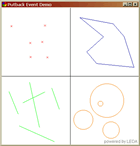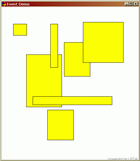Events
What is an Event?
In window systems the communication between input devices such as mouse or keyboard and application programs is realized by so-called events.- If the mouse pointer is moved across the window, the system generates motion events that can be used by an application program to keep track of the current position of the mouse pointer.
- If a mouse button is clicked, an event is generated that carries the information which button was pressed at what position.
- If a key is pressed, a keyboard event is triggered that tells the application program which key was pressed and what window had the input focus.
The Event Queue
Events are buffered in an event queue such that applications can access them in a similar way as character input of a C++ stream. It is possible to read and remove the next event from the queue and to push events back into the queue.The LEDA Events
LEDA supports only the following restricted set of events. Each event is represented by a five-tuple (type,window,value,position,time stamp).- type: an integer from the enumeration
enum {button_press_event,button_release_event,key_press_event,key_release_event,motion_event,configure_event,no_event} - window:
windowto which the event refers. Usually the window under the mouse pointer. - value: integer whose interpretation depends on the type of the event
- position: position of the mouse pointer in the user coordinate system at the time the event occurred
- time stamp: time of global system clock at which event occurred counted in milliseconds.
Blocking EventsThe operation int W.read_event(int& val, double& x,
double& y, unsigned long& t);
removes the first event from the event queue. If the event queue
is empty, the program waits until a new event occurs. This operation
is similar to the On the right you see a screenshot of the example for blocking events. |
|
|
The operation int W.read_event(int& val, double& x, double& y,
unsigned long& t, int timeout);
waits for at most |
|
Putting Back EventsThe global functionvoid put_back_event();puts the event handled last back to the event queue such that it will be processed by the next read_event() or read_mouse()
or basic input operation. This operation
is useful in programs that have to handle different types of input
objects using the basic input operations.
On the right you see a screenshot of the example for putting back events. |
 |
Non-Blocking EventsThe functionint W.get_event(int& val, double& x, double& y);is a non-blocking variant of W.read_event(). There is also
a more general non-member variant that allows to read events of arbritrary
windows
int read_event(<window*& wp, int& val, double& x, double& y); |
|
See also:
Pixel and User Coordinate System
Basic Data Types for 2D Geometry
